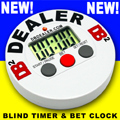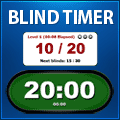Poker Dealers and Dealer Errors
I do not rotate the deal around the table for several reasons ...
- Many players are truly horrible at shuffling and dealing.
- It is best to have the dealer in the middle of the table, rather than at one end. This makes it easier for all
players to see the community cards and easier for the dealer to maneuver the chips into the pot.
- As Tournament Director, the most frequent problem you will encounter is – dealer error. You want competent dealers who
will make few mistakes.
We change dealers from one tourney to the next because ... it kinda sucks to be the dealer! When dealing, you are spending
so much time concentrating on the deal and pot that you pay less attention to each individual player ... and their tells.
 As host of the tourney, you probably should not deal as you will be busy getting up from the table to perform various hosting duties.
As host of the tourney, you probably should not deal as you will be busy getting up from the table to perform various hosting duties.
To speed up play, consider using two decks of different colored cards per table. Have the player to the button's
right shuffle a deck for the next dealer.
The dealer at the main table should also be responsible for timing the blinds using a kitchen timer or whatever
method you choose to use.
Here is a document on How Many Times Should You Shuffle a Deck of Cards. Here is a page on
How to Shuffle and
Cut a Deck of Cards One-Handed.
Dealer buttons may be purchased from most online poker supply sites and many chip sets
come with one included. You can also use any big button that happens to be lying around, preferably white in color.
Ask your Grandma for a white ceramic top to a round pillbox or cosmetics box. If you look around a drug store in the
cosmetics section, you will find all kinds of container tops that would make a suitable dealer puck - buy your wife
something nice! I use one official store-bought dealer button and several other homemade buttons.
You might consider using a cut card during your tourney. A cut card is made of thin colored
plastic and is placed on the bottom of the deck, after the cut, to prevent bottom card exposure during the deal. If
you don't have a cut card, you can make one by taping two jokers face-to-face. Most home games don't use a cut card
and it can be an inconvenience when it gets accidentally shuffled into the deck at the end of a hand by
in-experienced dealers. Rather than use a cut card, it is often simpler to just encourage dealers to lay the deck on
the table and deal the cards from there by sliding them off the top of the deck. The dealer doesn't hold the deck
so there is no risk that the cards will be exposed. This method also helps prevent bottom-dealing.
Instructions on How to Play and
How to Deal hold'em may be found on those pages. Make sure you also familiarize yourself with my
Cheating page. You should know what to look out for, especially from the dealers.
Here are various Robert's Rules pertaining to poker dealers and hands. My
Poker Tournament Rule Book and various other
downloadable documents on
this site contain the same information and may be printed for use during your tourney.
|
| If the first or second holecard dealt is exposed, a misdeal results. The dealer will retrieve the card, reshuffle,
and recut the cards. If any other holecard is exposed due to a dealer error, the deal continues. The exposed card may
not be kept. After completing the hand, the dealer replaces the card with the top card on the deck, and the exposed card is
then used for the burncard. If more than one holecard is exposed, this is a misdeal and there must be a redeal. |
| If the flop needs to be redealt because the cards were prematurely flopped before the betting was complete, or
the flop contained too many cards, the boardcards are mixed with the remainder of the deck. The burncard
remains on the table. After shuffling, the dealer cuts the deck and deals a new flop without burning a card. |
| If the dealer fails to burn a card before the flop, turn or river, the card will be shown to all players and then
discarded, the next card will take its place. [Note: Robert’s Rules is silent on this issue] |
| If the dealer turns the fourth card on the board before the betting round is complete, the card is taken out of
play for that round, even if subsequent players elect to fold. The betting is then completed. The dealer burns and turns
what would have been the fifth card in the fourth card’s place. After this round of betting, the dealer reshuffles the deck,
including the card that was taken out of play, but not including the burncards or discards. The dealer then cuts the deck and
turns the final card without burning a card. If the fifth card is turned up prematurely, the deck is reshuffled and
dealt in the same manner. |
|
|
1. The following circumstances cause a misdeal,
provided attention is called to the error before two players have acted on their hands. (If two players have acted in turn,
the deal must be played to conclusion, as explained in rule #2)
- The first or second card of the hand has been dealt faceup or exposed through dealer error.
- Two or more cards have been exposed by the dealer.
- Two or more boxed cards (improperly faced cards) are found.
- Two or more extra cards have been dealt in the starting hands of a game.
- An incorrect number of cards has been dealt to a player, except the top card may be dealt if it goes to the
player in proper sequence.
- Any card has been dealt out of the proper sequence (except an exposed card may be replaced by the burncard).
- The button was out of position.
- The first card was dealt to the wrong position.
- Cards have been dealt to an empty seat or a player not entitled to a hand.
- A player has been dealt out who is entitled to a hand. This player must be present at the table or have posted
a blind or ante.
2. Action is considered to occur in stud games when two players after the forced bet have acted on
their hands. In button games, action is considered to occur when two players after the blinds have
acted on their hands. Once action occurs, a misdeal can no longer be declared. The hand will be played
to conclusion and no money will be returned to any player whose hand is fouled. |
|
|
1. Your hand is declared dead if:
- You fold or announce that you are folding when facing a bet or a raise.
- You throw your hand away in a forward motion causing another player to act behind you (even if not facing a bet).
- In stud, when facing a bet, you pick your upcards off the table, turn your upcards facedown, or mix your upcards and
downcards together.
- The hand does not contain the proper number of cards for that particular game (except at stud a hand missing the
final card may be ruled live, and at lowball and draw high a hand with too few cards before the draw is live).
- You act on a hand with a joker as a holecard in a game not using a joker. (A player who acts on a hand without
looking at a card assumes the liability of finding an improper card, as given in Irregularities, rule #8.)
- You have the clock on you when facing a bet or raise and exceed the specified time limit.
2. Cards thrown into the muck may be ruled dead. However, a hand that is clearly identifiable
may be retrieved at management's discretion if doing so is in the best interest of the game. We will make
an extra effort to rule a hand retrievable if it was folded as a result of false information given to the player.
3. Cards thrown into another player’s hand are dead, whether they are faceup or facedown. |
|
| If a card with a different color back appears during a hand, all action is void and all chips in the pot are returned to
the respective bettors. If a card with a different color back is discovered in the stub, all action stands. If two
cards of the same rank and suit are found, all action is void, and all chips in the pot are
returned to the players who wagered them. One or more cards missing from the deck does not invalidate
the results of a hand. A card that is flashed by a dealer is treated as an exposed card. A card that is
flashed by a player will play. A downcard dealt off the table is an exposed card. If you drop a card on
the floor out of your hand, you must still play that card. A player must show all cards in the hand
face-up on the table to win any part of the pot. Cards speak (cards read for themselves). |
|
























